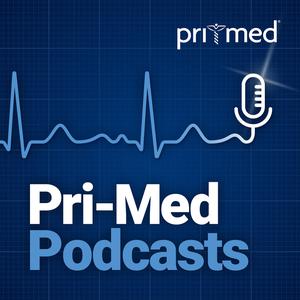
Pri-Med Podcasts
Pri-Med
- 8 minutes 5 secondsPositioning is Everything for Accurate BPs! - Frankly Speaking Ep 412
Credits: 0.25 AMA PRA Category 1 Credit™
CME/CE Information and Claim Credit: https://www.pri-med.com/online-education/podcast/frankly-speaking-cme-412Overview: Discover how improper arm positioning can lead to inaccurate blood pressure readings and influence hypertension management as we discuss a recent randomized controlled trial. Hear evidence-based techniques to ensure proper arm and cuff positioning, improving hypertension diagnosis in your clinical practice.
Episode resource links:
- JAMA Intern Med. Published online October 7, 2024. doi:10.1001/jamainternmed.2024.5213
Guest: Robert A. Baldor MD, FAAFP
Music Credit: Matthew Bugos
Thoughts? Suggestions? Email us at [email protected]
23 December 2024, 12:30 am - 11 minutes 56 secondsDon’t Miss the Red Flags for Early-Onset Colorectal Cancer - Frankly Speaking Ep 411
Credits: 0.25 AMA PRA Category 1 Credit™
CME/CE Information and Claim Credit: https://www.pri-med.com/online-education/podcast/frankly-speaking-cme-411Overview: This episode focuses on the rising prevalence of early-onset colorectal cancer and its critical indicators. Learn to recognize key symptoms, ensure timely diagnostic workups, and effectively address red flags to prevent delayed diagnosis.
Episode resource links:
-
Demb, J., Kolb, J. M., Dounel, J., Fritz, C. D. L., Advani, S. M., Cao, Y., Coppernoll-Blach, P., Dwyer, A. J., Perea, J., Heskett, K. M., Holowatyj, A. N., Lieu, C. H., Singh, S., Spaander, M. C. W., Vuik, F. E. R., & Gupta, S. (2024). Red Flag Signs and Symptoms for Patients With Early-Onset Colorectal Cancer: A Systematic Review and Meta-Analysis. JAMA network open, 7(5), e2413157. https://doi.org/10.1001/jamanetworkopen.2024.13157
-
US Preventive Services Task Force Screening Guidelines for Colorectal Cancer: https://www.uspreventiveservicestaskforce.org/uspstf/recommendation/colorectal-cancer-screening
-
American Cancer Society Infographic for Patients: Colorectal Cancer: Catching it Early https://www.cancer.org/cancer/types/colon-rectal-cancer/prevention-infographic.html
-
Gómez-Molina R, Suárez M, Martínez R, Chilet M, Bauça JM, Mateo J. Utility of Stool-Based Tests for Colorectal Cancer Detection: A Comprehensive Review. Healthcare. 2024; 12(16):1645. https://doi.org/10.3390/healthcare12161645
Guest: Jill M. Terrien PhD, ANP-BC
Music Credit: Matthew Bugos
Thoughts? Suggestions? Email us at [email protected]
16 December 2024, 12:30 am -
- 11 minutes 5 secondsTo D or Not to D? New Guidance on Vitamin Supplementation - Frankly Speaking Ep 410
Credits: 0.25 AMA PRA Category 1 Credit™
CME/CE Information and Claim Credit: https://www.pri-med.com/online-education/podcast/frankly-speaking-cme-410Overview: In this episode, we discuss the latest updates on vitamin D. Learn about its link to common disorders, when to consider supplementation, and what the most recent practice guideline says about vitamin D and disease prevention—empowering you to make informed decisions and improve patient care without unnecessary screenings or treatments.
Episode resource links:
- Marie B Demay, Anastassios G Pittas, Daniel D Bikle, Dima L Diab, Mairead E Kiely, Marise Lazaretti-Castro, Paul Lips, Deborah M Mitchell, M Hassan Murad, Shelley Powers, Sudhaker D Rao, Robert Scragg, John A Tayek, Amy M Valent, Judith M E Walsh, Christopher R McCartney, Vitamin D for the Prevention of Disease: An Endocrine Society Clinical Practice Guideline, The Journal of Clinical Endocrinology & Metabolism, Volume 109, Issue 8, August 2024, Pages 1907–1947, https://doi.org/10.1210/clinem/dgae290
- Michael F. Holick, Neil C. Binkley, Heike A. Bischoff-Ferrari, Catherine M. Gordon, David A. Hanley, Robert P. Heaney, M. Hassan Murad, Connie M. Weaver, Evaluation, Treatment, and Prevention of Vitamin D Deficiency: an Endocrine Society Clinical Practice Guideline, The Journal of Clinical Endocrinology & Metabolism, Volume 96, Issue 7, 1 July 2011, Pages 1911–1930, https://doi.org/10.1210/jc.2011-0385
Guest: Jillian Joseph, PA-C
Music Credit: Matthew BugosThoughts? Suggestions? Email us at [email protected]
9 December 2024, 12:30 am - 23 minutes 41 secondsWhen SSRIs are Not Enough: Targeting Residual Symptoms in Major Depressive Disorder
Credits: 0.50 AMA PRA Category 1 Credit™, 0.50 ABIM MOC or 0.41 AANP, including 0.41 AANP Pharm
CME/CE Information and Claim Credit: https://www.pri-med.com/online-cme-ce/Podcast/when-ssris-are-not-enoughOverview: In this podcast, expert faculty will discuss how the heterogeneity of major depressive disorder (MDD) symptoms, the frequency of residual symptoms, and the common occurrence of treatment-resistant depression (TRD) indicate a pathophysiology that is complex and multifactorial. The faculty will provide an overview of the current understanding of MDD pathophysiology and discuss how current standard-of-care treatments often fail to comprehensively target these mechanisms, emphasizing how future treatment developments can focus on under-addressed pathophysiological mechanisms, paving the way for personalized MDD treatments that target individual symptom profiles.
6 December 2024, 1:03 pm - 10 minutes 23 secondsBright Light Therapy for Depression: Useful in Any Season - Frankly Speaking Ep 409
Credits: 0.25 AMA PRA Category 1 Credit™
CME/CE Information and Claim Credit: https://www.pri-med.com/online-education/podcast/frankly-speaking-cme-409Overview: Listen in as we discuss how bright light therapy extends beyond seasonal affective disorder, potentially offering benefits for nonseasonal depression. Learn how to counsel patients effectively on its use and integrate this treatment into your practice, enhancing patient care and broadening treatment strategies for depression.
Episode resource links:
- Menegaz de Almeida A, Aquino de Moraes FC, Cavalcanti Souza ME, Cavalcanti Orestes Cardoso JH, Tamashiro F, Miranda C, Fernandes L, Kreuz M, Alves Kelly F. Bright Light Therapy for Nonseasonal Depressive Disorders: A Systematic Review and Meta-Analysis. JAMA Psychiatry. 2024 Oct 2:e242871
Guest: Alan M. Ehrlich, MD, FAAFP
Music Credit: Matthew BugosThoughts? Suggestions? Email us at [email protected]
2 December 2024, 12:30 am - 14 minutes 12 secondsTeenage Suicide and Social Media Use - Frankly Speaking Ep 408
Credits: 0.25 AMA PRA Category 1 Credit™
CME/CE Information and Claim Credit: https://www.pri-med.com/online-education/podcast/frankly-speaking-cme-408Overview: This episode explores the connection between adolescent mental health and social media use. We discuss actionable strategies for clinicians, emphasizing practical screening, effective conversation starters, and tech tools to guide families. Improve outcomes by learning to balance screen time discussions and proactive mental health interventions in primary care.
Episode resource links:
- JAMA Netw Open. 2024 Jul 1;7(7):e2419881. doi: 10.1001/jamanetworkopen.2024.19881
- https://www.cdc.gov/healthyyouth/data/yrbs/yrbs_data_summary_and_trends.htm
Guest: Alan M. Ehrlich, MD, FAAFP
Music Credit: Matthew BugosThoughts? Suggestions? Email us at [email protected]
25 November 2024, 12:30 am - 13 minutes 16 secondsBreast Cancer Risk and IUD Use - Frankly Speaking Ep 407
Credits: 0.25 AMA PRA Category 1 Credit™
CME/CE Information and Claim Credit: https://www.pri-med.com/online-education/podcast/frankly-speaking-cme-407Overview: Join us as we review the risks and benefits of contraceptive options, focusing on levonorgestrel intrauterine devices (IUDs) and their potential link to breast cancer risk. Hear the data and key considerations to help patients make informed decisions, balancing benefits and risks effectively in your primary care practice.
Episode resource links:
- Mørch LS, Meaidi A, Corn G, Hargreave M, Wessel Skovlund C. Breast Cancer in Users of Levonorgestrel-Releasing Intrauterine Systems. JAMA. Published online October 16, 2024. doi:10.1001/jama.2024.18575
- https://www.nytimes.com/2024/10/16/well/iud-breast-cancer-mirena-skyla.html?smid=url-share
Guest: Jillian Joseph, PA-C
Music Credit: Matthew BugosThoughts? Suggestions? Email us at [email protected]
18 November 2024, 12:30 am - 10 minutes 2 secondsThe Nose Knows: Nasal Therapies on the Rise - Frankly Speaking Ep 406
Credits: 0.25 AMA PRA Category 1 Credit™
CME/CE Information and Claim Credit: https://www.pri-med.com/online-education/podcast/frankly-speaking-cme-406Overview: An increasing number of therapies are being formulated for nasal delivery. This episode reviews the use of 3 of these therapies: at-home flu vaccines, epinephrine for allergic reactions, and saline nasal sprays for the common cold. Hear how these newly available treatments can increase options for care in your clinical practice.
Episode resource links:
- Flu Vaccine: Vaccine. 2015 Jul 31;33(32):3894-9. doi: 10.1016/j.vaccine.2015.06.061. Epub 2015 Jun 25.
- Nasal Saline: https://k4.ersnet.org/prod/v2/Front/Program?e=549
- Nasal Epinephrine: https://www.fda.gov/news-events/press-announcements/fda-approves-first-nasal-spray-treatment-anaphylaxis
Guest: Robert A. Baldor MD, FAAFP
Music Credit: Matthew Bugos
Thoughts? Suggestions? Email us at [email protected]
11 November 2024, 12:30 am - 11 minutesThe PREVENT Risk Calculator: A New Equation for Predicting Heart Health - Frankly Speaking Ep 405
Credits: 0.25 AMA PRA Category 1 Credit™
CME/CE Information and Claim Credit: https://www.pri-med.com/online-education/podcast/frankly-speaking-cme-405Overview: Explore the American Heart Association’s (AHA) newly validated risk calculator, designed to assess the likelihood of cardiovascular disease and heart failure in patients aged 30-79 years. Hear which risk factors are included, why they matter, and how this tool can enhance your preventive care strategies in primary care practice.
Episode resource links:
- Hypertension. 2024;81:00–00. DOI: 10.1161/HYPERTENSIONAHA.124.22998.)
- https://doi.org/10.1161/CIRCULATIONAHA.123.067626
- The calculator: https://professional.heart.org/en/guidelines-and-statements/prevent-calculator
Guest: Robert A. Baldor MD, FAAFP
Music Credit: Matthew Bugos
Thoughts? Suggestions? Email us at [email protected]
4 November 2024, 12:30 am - 16 minutes 17 seconds“Not Tonight”—The Impact of Female Sexual Dysfunction on Women’s Well-Being - Frankly Speaking Ep 404
Credits: 0.25 AMA PRA Category 1 Credit™
CME/CE Information and Claim Credit: https://www.pri-med.com/online-education/podcast/frankly-speaking-cme-405Overview: It’s estimated that between 40%-60% of women report some degree of sexual dysfunction, which can have a significant impact on an individual’s quality of life and personal relationships. Even though most clinicians understand the importance and relevance of female sexual dysfunction (FSD), they may not be aware of its prevalence, effective treatments, or how best to inquire about it. Join us as we discuss this condition, its impact on women, and evidence on effective treatments.
Episode resource links:
- Cristine Homsi Jorge, Kari Bø, Camila Chiazuto Catai, Luiz Gustavo Oliveira Brito, Patricia Driusso, Merete Kolberg Tennfjord. Pelvic floor muscle training as treatment for female sexual dysfunction: a systematic review and meta-analysis. American Journal of Obstetrics and Gynecology. Volume 231, Issue 1, 2024,Pages 51-66.e1,ISSN 0002-9378, https://doi.org/10.1016/j.ajog.2024.01.001.(https://www.sciencedirect.com/science/article/pii/S0002937824000061)
- Davis, SR. Sexual dysfunction in women. New England Journal of Medicine. V 391. N 8; P 736-745. https://www.nejm.org/doi/full/10.1056/NEJMcp2313307
- Johnson, Isabella MS; Thurman, Andrea Ries MD; Cornell, Katherine A. BS; Hatheway, Jessica MBA; Dart, Clint MS; Brainard, C. Paige MD; Friend, David R. PhD; Goldstein, Andrew MD. Preliminary Efficacy of Topical Sildenafil Cream for the Treatment of Female Sexual Arousal Disorder: A Randomized Controlled Trial. Obstetrics & Gynecology ():10.1097/AOG.0000000000005648, June 18, 2024. | DOI: 10.1097/AOG.0000000000005648
- Kamrul-Hasan, A.B.M, Hannan, M A A, Muhammad S, M, Aalpona, Fatema, T Z, Nagendra, L., Selim, S, Dutta, D, D. Role of flibanserin in managing hypoactive sexual desire disorder in women: A systematic review and meta-analysis. Medicine 103(25):p e38592, June 21, 2024. | DOI: 10.1097/MD.0000000000038592
- Yao H, Zhang X, Sun F, Tang G, Wu J, Zhou Z. The efficacy of intravaginal electrical stimulation (IVES) in treating female with urinary incontinence symptom from meta-analysis of nine randomized controlled trials. Front Neurol. 2022;13:933679. Published 2022 Sep 13. doi:10.3389/fneur.2022.933679
- Huang H, Ding G, Li M, Deng Y, Cheng Y, Jin H.(2023) Menopause and stress urinary incontinence: The risk factors of stress urinary incontinence in perimenopausal and postmenopausal women. J Obstet Gynaecol Res. 49(10): 2509–2518. https://doi.org/10.1111/jog.15742
- Tunn, R., Baessler, K., Knüpfer, S., & Hampel, C. (2023). Urinary Incontinence and Pelvic Organ Prolapse in Women. Deutsches Arzteblatt international, 120(5), 71–80. https://doi.org/10.3238/arztebl.m2022.0406
Guest: Susan Feeney, DNP, FNP-BC, NP-C, Jill M. Terrien, PhD, ANP-BC
Music Credit: Matthew Bugos
Thoughts? Suggestions? Email us at [email protected]
28 October 2024, 12:30 am - 12 minutes 47 secondsStarting Medications for T2DM: When Metformin Isn’t the First Choice - Frankly Speaking Ep 403
Credits: 0.25 AMA PRA Category 1 Credit™
CME/CE Information and Claim Credit: https://www.pri-med.com/online-education/podcast/frankly-speaking-cme-403Overview: Recorded live at Pri-Med East! - The American Diabetes Association (ADA) has updated their standards of care for patients with diabetes. In this episode, we discuss some of the changes in the initial selection of glucose-lowering medications for type 2 diabetes mellitus (T2DM), including when alternatives to metformin may be appropriate. Hear strategies for making personalized, guideline-recommended choices that enhance care for patients with T2DM.
Episode resource links:
- Pharmacologic Approaches to Glycemic Treatment. In: American Diabetes Association. Standardsof Care in Diabetes2024 - DiabetesCare 2024 Jan 1;47(Suppl 1):S1-S321
Guest: Alan M. Ehrlich, MD, FAAFP
Music Credit: Matthew Bugos
Thoughts? Suggestions? Email us at [email protected]
21 October 2024, 12:30 am - More Episodes? Get the App
Your feedback is valuable to us. Should you encounter any bugs, glitches, lack of functionality or other problems, please email us on [email protected] or join Moon.FM Telegram Group where you can talk directly to the dev team who are happy to answer any queries.
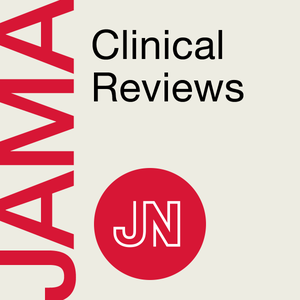 JAMA Clinical Reviews
JAMA Clinical Reviews
 AFP: American Family Physician Podcast
AFP: American Family Physician Podcast
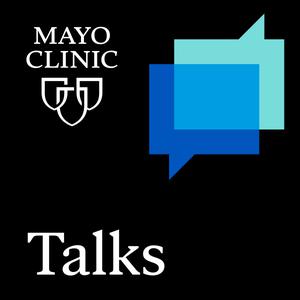 Mayo Clinic Talks
Mayo Clinic Talks
 Frankly Speaking About Family Medicine
Frankly Speaking About Family Medicine
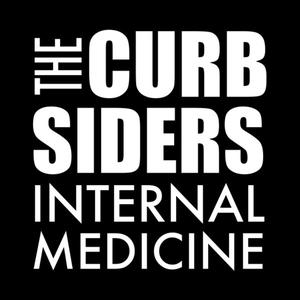 The Curbsiders Internal Medicine Podcast
The Curbsiders Internal Medicine Podcast
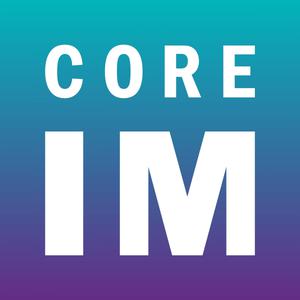 Core IM | Internal Medicine Podcast
Core IM | Internal Medicine Podcast